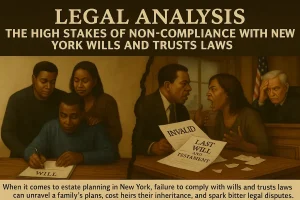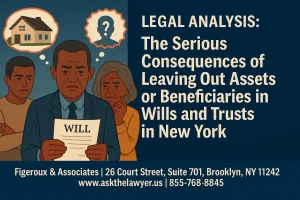By Brian Figeroux, Esq. | Editorial Credit: Editorial Credit: Fizkes / shutterstock.com
Divorce proceedings can be emotionally and legally challenging, even in seemingly straightforward cases, such as short-term marriages with children. When an individual in New York State dies without having finalized a divorce, especially after a failed marriage lasting less than three years, the implications for their estate can be substantial. The presence of minor children further complicates the scenario, as custody and inheritance issues arise. This analysis explores the impact on the estate of a deceased individual who did not complete an uncontested divorce, comparing scenarios where the deceased left a will versus cases of dying intestate (without a will). Key considerations include how the legal status of the estranged spouse affects the distribution of assets, guardianship of children, and strategies for protecting the estate under New York law.
- Legal Background: New York State Estate and Divorce Laws
1.1 Estate Distribution in New York State
New York State’s laws governing estate distribution differ significantly depending on whether the deceased left a valid will. If a will exists, it generally dictates how assets are to be distributed, subject to spousal rights and other legal exceptions. In the absence of a will, New York’s intestacy laws come into play, determining the distribution based on a statutory scheme that prioritizes spouses and children.
1.2 Divorce and Its Impact on Estate Planning
For a divorce to be legally recognized, it must be finalized through a court judgment. In cases where a person dies without completing a divorce, their spouse retains full legal rights, including inheritance rights, even if the marriage was short and contentious. This can have profound implications for estate planning, especially when children are involved, as their financial security and guardianship may be affected by the unfinished divorce.
- Impact on the Estate with a Will but an Unfinished Divorce
2.1 The Role of a Will in Estate Distribution
A will outlines the deceased’s wishes for asset distribution, guardianship of minor children, and the appointment of an executor. While a will provides a directive for managing the estate, it cannot override certain spousal rights under New York law.
2.2 Spousal Rights Despite the Existence of a Will
Even when a will is present, the estranged spouse maintains specific rights that can disrupt the intended distribution:
- Elective Share Right: In New York, a surviving spouse has the right to claim an elective share of the estate, usually one-third, regardless of the will’s terms. This right extends to probate and certain non-probate assets, such as jointly held property and retirement accounts, unless the spouse has explicitly waived this right through a prenuptial or postnuptial agreement.
- Revocation of Beneficiary Designations: Generally, upon divorce, beneficiary designations naming the spouse are automatically revoked. However, this revocation does not apply if the divorce was incomplete, meaning the estranged spouse might still receive designated benefits.
2.3 Estate Implications for Short Marriages with Children
In short marriages with children, the financial entanglement is usually limited, but the presence of minor children complicates estate planning significantly. The unfinished divorce impacts the estate in several ways:
- Unintended Inheritance by the Estranged Spouse: If the will was drafted during the marriage or before the marital breakdown, it might still list the estranged spouse as a beneficiary or executor. Failing to update the will could lead to the spouse inheriting assets, potentially at odds with the deceased’s wishes.
- Guardianship and Custody of Children: If the deceased parent intended for someone other than the estranged spouse to have custody of the children, this must be clearly outlined in the will. Otherwise, the estranged spouse may retain primary custodial rights, which could conflict with the deceased’s intentions.
- Contesting the Will: The estranged spouse may contest the will, arguing that they are entitled to more assets or should have custodial rights over the children. This can result in drawn-out legal disputes that delay distribution to other heirs and increase the estate’s legal costs.
2.4 Example Scenario: With a Will but an Unfinished Divorce
Consider a scenario where Jessica, who had been married to Robert for two and a half years, dies unexpectedly with a will. The couple has a young child, and although they were separated, their divorce was never finalized. Jessica’s will leaves her estate primarily to her child, with her sister designated as the child’s guardian. However, Robert, as the estranged spouse, exercises his elective share rights, claiming a portion of the estate. Furthermore, Robert may challenge the guardianship arrangement, seeking custody of their child, potentially undermining Jessica’s wishes.
- Impact on the Estate Without a Will and an Unfinished Divorce (Intestate Succession)
3.1 Overview of Intestate Succession in New York
When a person dies without a will in New York, their estate is distributed according to intestate succession laws, which prioritize the surviving spouse and children. The specific distribution depends on the number of surviving family members.
3.2 Automatic Rights of an Estranged Spouse and Children
In the absence of a will, the estranged spouse retains their rights as a legal spouse:
- Inheritance of a Substantial Portion of the Estate: If there are children, the estranged spouse is entitled to the first $50,000 of the estate and half of the remaining balance, with the other half going to the children. If there are no children, the estranged spouse inherits the entire estate.
- Control Over Estate Administration: The estranged spouse has the right to be appointed as the estate administrator, granting them significant control over the distribution and management of assets.
- Custody and Guardianship of Children: The surviving spouse typically retains custodial rights over the children unless there are compelling reasons to appoint another guardian. This can complicate financial decisions, as the estranged spouse would manage the children’s inheritance.
3.3 Complications in Estate Administration
An estranged spouse’s legal standing can complicate estate administration, particularly when there are minor children involved:
- Access to Children’s Inheritance: The estranged spouse may have access to funds meant for the children, especially if the estate includes assets designated for the child’s care. This access could lead to financial disputes if the estranged spouse uses these assets in ways that contradict the deceased’s wishes.
- Delays and Financial Disputes: Intestate estates often face prolonged legal processes, especially if there are disputes about the spouse’s rights or if other family members challenge the estranged spouse’s control over the estate.
3.4 Example Scenario: Without a Will and an Unfinished Divorce
Imagine Alex, who was married to Emily for less than three years, dies without a will. The couple has a two-year-old son, and they had been separated for over a year but never finalized their uncontested divorce. Under New York’s intestate succession laws, Emily inherits the first $50,000 of Alex’s estate and half of the remainder, while the son inherits the other half. Emily also retains custody of their son, giving her control over his inheritance until he reaches adulthood. This arrangement could be contrary to Alex’s wishes, particularly if their separation was contentious.
- Financial and Legal Implications for Short Marriages with Children
4.1 Asset Protection and Financial Security for Children
In short marriages with children, protecting the financial security of the children is often the primary concern in estate planning. An unfinished divorce can undermine these goals:
- Reduced Assets for Children: The estranged spouse’s inheritance rights can significantly reduce the assets available for the children. Even if the spouse’s relationship with the deceased was brief and troubled, they are still entitled to a substantial portion of the estate.
- Mismanagement Risks: If the estranged spouse gains control over the children’s inheritance, there is a risk of mismanagement, especially if there were marital tensions or differing financial philosophies between the deceased and the estranged spouse.
4.2 Tax Implications
The unfinished divorce may introduce unexpected tax consequences that can affect the estate and the children’s inheritance:
- Estate Taxes: The marital status of the deceased can impact estate tax calculations. If the estranged spouse inherits a substantial portion of the estate, this might affect the overall tax liabilities, potentially reducing the funds available for the children.
- Tax on Investment Income: If the estranged spouse controls assets left to the children, such as investment accounts, their decisions on managing these funds can affect the tax burden on the estate.
4.3 Legal Costs and Family Disputes
The involvement of an estranged spouse often leads to disputes, which can deplete the estate and cause emotional turmoil:
- Guardianship Disputes: Other family members, such as grandparents or siblings, may contest the estranged spouse’s rights to custody, particularly if the spouse’s behavior is deemed unfit or if they have a strained relationship with the deceased’s family.
- Litigation Expenses: Legal battles over custody, guardianship, and asset control can incur significant expenses, further diminishing the estate’s value and delaying the distribution of assets to the children.
- Strategies to Protect the Estate and Safeguard Children’s Interests
5.1 Completing the Divorce Process Quickly and Efficiently
To protect their estate and children’s financial future, individuals should prioritize completing the divorce process promptly. Finalizing the divorce legally severs the estranged spouse’s rights, preventing them from inheriting under New York’s intestacy laws or exercising elective share rights.
5.2 Updating Estate Planning Documents
Regular updates to estate planning documents, including wills, trusts, and beneficiary designations, are critical, especially during marital separations or divorce proceedings. Ensuring that these documents reflect current intentions can help safeguard assets for children and prevent unintended distributions to an estranged spouse.
5.3 Establishing Trusts for Children’s Inheritance
Setting up a trust for the children’s inheritance can provide additional protection against an estranged spouse’s control. Trusts allow the deceased to appoint a trusted individual, such as a relative or professional trustee, to manage the assets on behalf of the children, ensuring that funds are used for their intended purposes.
- Guardianship Provisions: Trust documents can include provisions that align with the deceased’s wishes for guardianship, helping to prevent disputes and clarifying who should care for the children in the event of their death.
- Financial Oversight: Trusts can provide a structured approach to managing the children’s inheritance, minimizing the risk of mismanagement by the estranged spouse.
5.4 Prenuptial and Postnuptial Agreements
Prenuptial or postnuptial agreements can be valuable tools for protecting assets in the event of death, especially in short marriages. These agreements can specify the rights of each spouse to the other’s estate and can include waivers of elective share rights, providing clarity and reducing potential conflicts.
5.5 Designating Guardianship Clearly
Clearly designating a preferred guardian for minor children in estate planning documents is crucial. By outlining the reasons for choosing a particular guardian, the deceased can strengthen their case against potential challenges from an estranged spouse, especially if there are concerns about the spouse’s ability to provide a stable environment.
- Letter of Explanation: Accompanying the will with a letter explaining the reasons for guardianship decisions can provide context and support in any legal disputes over custody, reinforcing the deceased’s intentions.
5.6 Engaging Legal and Financial Advisors
Working with experienced estate planning attorneys and financial advisors can help navigate the complexities of New York’s estate and divorce laws. Advisors can provide critical guidance on updating documents, structuring trusts, and implementing strategies that protect the children’s financial interests and minimize the estranged spouse’s influence.
Conclusion
The failure to complete an uncontested divorce can significantly affect estate distribution in New York State, particularly in short marriages with children. Whether the deceased leaves a will or dies intestate, the estranged spouse’s legal rights pose substantial risks to the intended distribution of assets and the financial security of the children. Proactive estate planning, completing divorce proceedings, and employing protective measures like trusts and updated legal documents are essential steps in safeguarding the estate and ensuring that the children’s interests are prioritized. Understanding the intersection of divorce and estate law can help individuals make informed decisions, minimizing conflict and protecting their legacy for their children.
Click Here to Schedule a Consultation with Figeroux & Associates Today!




